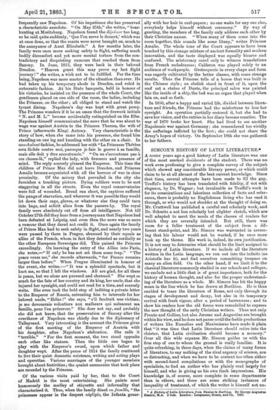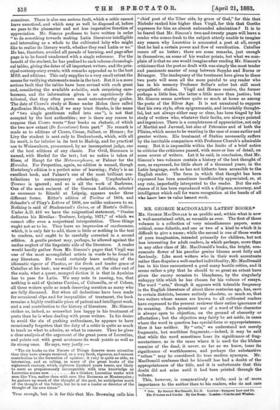SIMCOX'S HISTORY OF LATIN LITERATURE.*
A DOZEN years ago a good history of Latin literature was one of the most marked desiderata of the student. There was no. work even professing to give a complete survey of the subject which showed any considerable literary power, or which could' claim to be at all abreast of the best current knowledge. Since that time, several attempts have been made to fill the gap. Teuffel's history has been translated with fidelity, if not with elegance, by Dr. Wagner; but invaluable as Teuffel's work is for its conscientious and laborious collection of facts and references, there is probably no Englishman living who has read it through, or who would not shudder at the thought of doing so. Mr. Cruttwell has published a careful and scholarly work, and Dr. Schmitz a not less scholarly but slighter sketch, which arewell adapted to meet the needs of the classes of readers for which they are severally intended. But still, there was room for a fuller treatment of the subject from a different stand-point, and Mr. Simcox was warranted in assuming that his labour would not be wasted, if he once more took up the theme. His work is, indeed, its own justification. It is not easy to determine what should be the limit assigned to a history of Latin literature. If we include all the literaturewritten in the Latin language, we run out into the infinite (as Aristotle has it), and find ourselves committing trespass on many an alien field. On the other hand, if we limit it to the classical literature commonly studied in our schools and colleges,. we exclude not a little that is of great importance, both for the history of human thought, and also for the proper understand,ing of the literature as a whole. Mr. Simcox has hit the happy mean in the line which he has drawn at Boethius. He is thus enabled to trace the literature of Rome, not only through its stages of development and decay, but also in its temporary revival with fresh vigour, after a period of barrenness ; and to show his readers how the old forms were remodelled to express the new thought of the early Christian writers. Thus not only Pronto and Gellius, but also Jerome and Augustine are brought within his view, and he does not pause until the feeble productions of writers like Eunodius and Maximianus have made it plain that " it was time that Latin literature should retire into the cloister, that Latin civilisation should become a memory." Over all this wide expanse Mr. Simcox guides us with the firm step of one to whom the ground is really familiar. It is quite refreshing, in these days, when the claims of many forms of literature, to say nothing of the rival urgency of science, are so distracting, and when we have to be content too often either with second-hand compilations or with the monographs of specialists, to find an author who has plainly read largely for himself, and who is giving us his own fresh impressions. His knowledge is, of course, more complete in some departments; than in others, and there are some striking instances of inequality of treatment, of which the writer is himself not un
conscious. There is also one serious fault, which a critic cannot leave unnoticed, and which may as well be disposed of, before we pass to the pleasanter and not less imperative function of appreciation. Mr. Simcox professes to have written in order "to do something towards making Latin literature intelligible and interesting as a whole to the cultivated laity who might like to realise its literary worth, whether they read Latin or no." He has, therefore, avoided all parade of learning, and page after page is to be found unadorned with a single reference. For the benefit of the student, he has prefixed to each volume chronological tables, giving the dates of all important writers, and the principal contemporary events, with remarks appended as to the best MSS. and editions. This only supplies to a very small extent the means for verifying statements made in the text. Bnt it is a more serious fault that the tables have been revised with such great and, considering the available subsidies, such surprising carelessness, and the information given is so capriciously distributed, that they often prove most untrustworthy guides. The date of Cicero's study at Rome under Molon (here called Apollonius Molon, which, if we may trust Strabo, is the name of "two single gentlemen rolled into one "), is not that accepted by the best authorities ; nor is there any reason to suppose that Cicero wrote " four books on rhetoric, of which the two now extant (De Invention) form part." No remark is made as to editions of Cicero, email., Saline, or Horace ; for Livy the student is sent only to Drakenborch, which, with all its merit, is far inferior in its text to Madvig, and for practical use to Weissenborn, pronounced, by no incompetent judge, one of the best editions of any classic. For Ovid, Barman is named, with Merkel for the text; but no notice is taken of Riese, of Haupt for the Metamorphoses, or Palmer for the Heroides. For Properties, again, no edition is named, though Hertzberg's edition is a perfect mine of learning; Paley's is an excellent book, and Palmer's one of the most brilliant contributions to contemporary scholarship. Umpfenbach's Terence is ignored ; and so is all the work of Baehrens. One of the most eminent of the German Latinists, selected as successor to Ritschl at Leipzig, appears under three different forms. Ritter's edition of Tacitus of 1864, and Schaefer's of Pliny's Letters of 1868, are unlike unknown to us. Nothing is said of Studemund's Gains, or of Hertz's Gellius. Under A.D. 416 we have the enigmatical statement, " Onsins dedicates his Rivellas : Teubner, Leipzig, 1871," of which we cannot offer even a conjectural interpretation. These things ought not so to be. They leave an impression of carelessness, which, it is only fair to add, there is little or nothing in the text to confirm, and ought to be carefully corrected in a second edition. A gentle protest may, perhaps, be allowed against the undue neglect of the linguistic aide of the literature. A reader would hardly gather from Mr. Simcox's pages that Virgil was one of the most accomplished artists in words to be found in any literature. He would certainly learn nothing of the idiomatic rigour of Plautus, or the fresh and tender grace of Catullus at his best ; nor would he suspect, at the other end of the scale, what a queer, mongrel diction it is that in Apnleius has to pass for Latin. We may note in passing, too, that nothing is said of Quintus Curtius, of Columella, or of Celsas, all three writers quite as much deserving mention as many who are fully discussed. But when all deductions have been made for occasional slips and for inequalities of treatment, the book remains a highly creditable piece of patient and intelligent work, and a real contribution to the history of literature. Mr. Simcox strikes us, indeed, as somewhat less happy in his treatment of poets than he is when dealing with prose writers. In his desire to avoid the sin of gushing enthusiasm, he appears to have occasionally forgotten that the duty of a critic is quite as much to teach us what to admire, as what to censure. Thus he gives a clear analysis of the argument of the great poem of Lucretius, and points out with great acuteness its weak points as well as its strong ones. He says, very justly :
"The six books on the Nature of Things deserve more attention than they have always received, as a very fresh, vigorous, and earnest contribution to the formation of opinion; it (sic) is quite as able, as interesting, and as telling, as many of the great books of the eighteenth century, which, eighteen hundred years hence, are likely to seem as preposterously incompatible with tree knowledge as Lucretius seems now As a thinker, Lucretius ranks with men like Vico, rather than with men like Rousseau or Montesquieu ; be gathers up much of the thought of the past, he anticipates much of the thought of the future, but he is not a leader or director of the thought of his own times."
True enough, but is it for this that Mrs. Browning calls him " chief poet of the Tiber aide, by grace of God," for this that Niebuhr ranked him higher than Virgil, for this that Goethe expresses for him an almost unbounded admiration P It is to be feared that Mr. Simcox's two-and-twenty pages will leave a reader who comes fresh to the subject utterly unable to imagine any reason why Lucretius is accounted a poet at all, except that he had a certain power and flow of versification. Catullus comes off no better; there are some remarks, just enough in themselves, on some of his weaker points, but what we complain of is that no one would imagine after reading Mr. Simoox's criticisms that the poet so dealt with was simply the most tender and passionate master of song between Sappho and Barns or Beranger. The inadequacy of the treatment here given to these two poets will seem all the more painful to any reader who has in his memory Professor Seller's sober but still most sympathetic studies. Virgil and Horace receive, the former perhaps a little less, the latter a little more than justice; but Mr. Simcox seems nowhere quite so much at home as among the poets of the Silver Age. It is not unnatural to suppose that his own style, often epigrammatic, and invariably thoughtful, but not always either easy or clear, has been tinged by his study of writers who, whatever their faults, are always pointed and ingenious. There is a completeness of appreciation, not only of Martial and Juvenal, but also of Petronius and of both the Plinies, which seems to be wanting in the case of some earlier and greater writers. His treatment of Statins necessarily suffers by the inevitable comparison with Professor Church's admirable essay. But it is impossible within the limits of a brief notice to criticise the criticisms passed, with more or less of detail, on some scores of writers. Let it be said, in conclusion, that Mr. Simcox's two volumes contain a history of the best thought of men, as expressed, for little short of a thousand years, in the Latin language, such as has not hitherto been accessible to the English reader. The form in which that thought has been expressed has been sometimes insufficiently appreciated, or, at any rate, imperfectly interpreted to the reader. But the substance of it has been reproduced with a diligence, accuracy, and intelligence which call for warm recognition at the hands of all who know hew to value honest work.



































 Previous page
Previous page